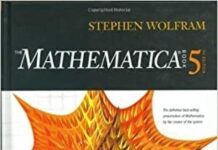
Ebook Info
- Published: 2018
- Number of pages: 608 pages
- Format: PDF
- File Size: 26.71 MB
- Authors: Stephen Wolfram
Description
Are mathematical equations the best way to model nature? For many years it had been assumed that they were. But in the early 1980s, Stephen Wolfram made the radical proposal that one should instead build models that are based directly on simple computer programs. Wolfram made a detailed study of a class of such models known as cellular automata, and discovered a remarkable fact: that even when the underlying rules are very simple, the behaviour they produce can be highly complex, and can mimic many features of what we see in nature. And based on this result, Wolfram began a program of research to develop what he called A Science of Complexity.”The results of Wolfram’s work found many applications, from the so-called Wolfram Classification central to fields such as artificial life, to new ideas about cryptography and fluid dynamics. This book is a collection of Wolfram’s original papers on cellular automata and complexity. Some of these papers are widely known in the scientific community others have never been published before. Together, the papers provide a highly readable account of what has become a major new field of science, with important implications for physics, biology, economics, computer science and many other areas.
User’s Reviews
Reviews from Amazon users which were colected at the time this book was published on the website:
⭐Back in the early 1980s Stephen Wolfram wrote a number of seminal papers that began the field of Cellular Automata. Yes, its origins do go back to Von Neumann and Ulam, but the subject only really took off as a field of scientific endeavor with this collected early work of Wolfram’s. As such this is a very valuable historical collection where the reader can actually see the subject of CA being created and developed year by year. You can see, amongst other things, the unfolding of the four part classification scheme, the algebraic properties of CA, higher order CA, universal computation, and of course complexity.John Conway’s Game of Life cellular automaton which predates Wolfram by a decade is also mentioned – but for the most part Wolfram’s own work takes center stage.In the CA world, complexity evolves from a simple set of rules and this single notion has made CA a valuable tool in modelling a multitude of natural phenomena. It does not represent the end of mathematical modelling but represents another approach to viewing the world we live in. Interestingly, some of the models are virtually mathematics free and in some cases do a better job than the more traditional partial differentiation approach. As a bi-product with CA, you get a visual portrayal of how your model evolves with time. This visual aspect is one of the many attractions of the CA approach and so conspicuous in Wolfram’s works.Of course, the field of CA has itself evolved considerably from Wolfram’s seminal beginnings. But if you want one reference work of how it all began then this is an excellent source.
⭐Mag sein, dass Stephen Wolfram nicht der größte Mathematiker seiner Zeit ist, visionär ist er in jedem Fall und kaum ein Mathematiker hat diese “reine” Wissenschaft der Praxis näher gebracht. Dieses Buch ist quasi die Vorarbeit zu ” A New Kind Of Science” und erlaubt so die Begleitung des Wissenschaftlers Wolfram.
⭐
Keywords
Free Download Cellular Automata And Complexity: Collected Papers 1st Edition in PDF format
Cellular Automata And Complexity: Collected Papers 1st Edition PDF Free Download
Download Cellular Automata And Complexity: Collected Papers 1st Edition 2018 PDF Free
Cellular Automata And Complexity: Collected Papers 1st Edition 2018 PDF Free Download
Download Cellular Automata And Complexity: Collected Papers 1st Edition PDF
Free Download Ebook Cellular Automata And Complexity: Collected Papers 1st Edition


